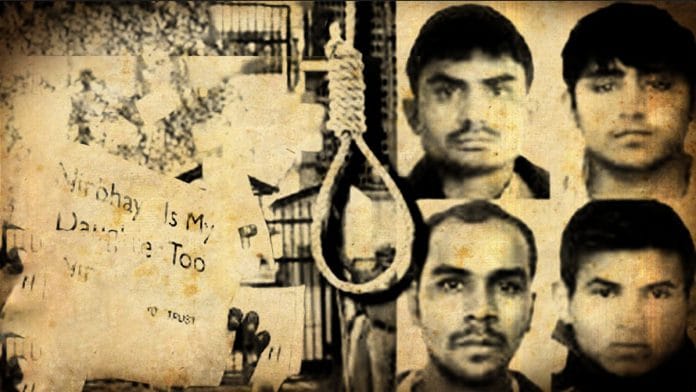New Delhi: Highlighting how the quest for justice for ‘Nirbhaya’, the moniker given to the 23-year-old victim of the 2012 Delhi gangrape case, is a “blot on our collective conscience”, a parliamentary panel Thursday recommended that accused involved in heinous crimes should be denied bail.
The 31-member Parliamentary Standing Committee on Human Resource Development, headed by BJP Rajya Sabha MP Satyanarayan Jatiya, tabled its report on ‘Issues related to safety of women’ in the Upper House Thursday, also recommending that necessary amendments be made in the law to ensure that chargesheets are filed within 30 days.
On the same day, a Delhi court declined to stay the death warrants of the four men convicted of the 2012 gangrape and murder, paving the way for their execution Friday, 20 March, over seven years and three months after the incident.
Also read: Final wish, last meal – Why remaining hours of Dec 2012 convicts will ride an emotional wave
‘Guilty be punished immediately’
The parliamentary committee noted in its report that the Delhi gangrape case and the “public hailing of police action” in Hyderabad, where the police killed four rape accused in an encounter, echoes the “sentiment of the society that the guilty be punished immediately”.
Calling for a time-bound investigation and conclusion of the trial within a year, the panel, which has members from both houses of Parliament, said the ministries of law and home affairs should introspect, along with associated law enforcement agencies, as the system is not functioning in a way to provide timely justice.
The panel has also recommended disposal of pending cases within six months, to provide a reasonable time for justice and surety of punishment.
According to the National Crime Records Bureau data for 2018, the total number of crimes against women has risen continuously for the last decade. The number for 2018 was 3,78,277, up from 2,44,270 in 2012.
To address crimes against women in a more effective manner, the committee has recommended that the home ministry should set up women’s cells in all police stations across the country with female police officers and staff who are trained to handle cases related to gender-based violence.
It has also batted for a single helpline number for registering all complaints, and for seeking help in cases related to women’s safety.
Also read: India needs to abolish death penalty, and not hang 2012 Delhi gangrape convicts
Fast-track courts and low conviction rates
While pushing for quick delivery of justice, the committee said it is anguished to note that a number of states like Andhra Pradesh, Bihar, West Bengal, Uttar Pradesh have still not given their concurrence for setting up special fast track courts to handle crimes against women.
It has urged the Department of Justice, which comes under the law ministry, to pursue the matter with the states, to ensure that 1,800 fast track courts become operational at the earliest. Such courts should decide the matter within six months of the incident taking place, it recommended.
The committee also noted the low conviction rate in crimes against women, and recommended that the home ministry should set up one forensic laboratory in every state capital within two years’ time.
Currently, the conviction rate in rape cases is only 32 per cent, despite chargesheets being filed in 86.6 per cent of cases.
The panel also noted that there is no mechanism to register incidents of sexual harassment and violence in trains. Recommending that the railway ministry set up complaint centres at each station, the parliamentary panel has also said the railway and home ministries should set up a mechanism to lodge cases on the train itself.
Also read: Why it’s wrong to question ‘delay’ in hanging of convicts in 2012 Delhi gangrape-murder case
Reservation for women at all levels
The standing committee has also called for the swift implementation of 33 per cent reservation for women at all levels of the political system — from the panchayats to Parliament.
“The committee is of the strong view that crime against women take place because society sees them in an inferior position in the societal set-up. This is mainly because women are not represented in the decision-making process,” the panel noted.
“It has been established by a number of researches that if women are placed at decision-making places, incidences of violence decrease at such places,” it said.
In India, women’s representation in public life is very low. According to figures quoted in the parliamentary panel report, women account for only nine per cent of Supreme Court judges, 10 per cent of Rajya Sabha MPs, 14 per cent of Lok Sabha MPs, and just 11.5 per cent in the All India Services (the top civil services).
Also read: Modi hails triple talaq law as achievement, but is very quiet on women reservation bill






